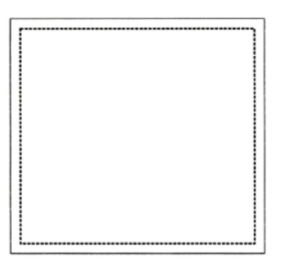BACKGROUND TO THE DISPUTE
On 12 January 2007, Mr. Guasch Pubill applied for the following registration of a Community design at the European Union Intellectual Property Office (EUIPO):
 The goods in respect of which registration was sought are in, inter alia, within Class 6.13 of the Locarno Agreement, corresponding to the following description: ‘Cleaning cloths, table linen’.
The goods in respect of which registration was sought are in, inter alia, within Class 6.13 of the Locarno Agreement, corresponding to the following description: ‘Cleaning cloths, table linen’.
On 15 February 2016, the intervener, Nap-Kings, S. L., filed an application for a declaration of invalidity of the contested design pursuant to Article 52 of Regulation No 6/2002, relying on its following earlier industrial design right:
 The Cancellation Division upheld the appeal and declared it invalid. The appellant then lodged an appeal against the decision of the Cancellation Division with EUIPO, but by decision of 23 June 2020, the Third Board of Appeal of EUIPO dismissed the appeal.
The Cancellation Division upheld the appeal and declared it invalid. The appellant then lodged an appeal against the decision of the Cancellation Division with EUIPO, but by decision of 23 June 2020, the Third Board of Appeal of EUIPO dismissed the appeal.
DECISION OF THE GENERAL COURT
I) The plea alleging infringement of Article 7 of Regulation No 6/2002
That article provides, inter alia, that ‘a design shall be deemed to have been disclosed if it has been made available to the public after its entry in the Register or if it has been exhibited, put on the market or otherwise disclosed before the date of filing of the application‘.
In relation to the above, the Court states:
- “The Board of Appeal considered that the earlier design had indeed been disclosed in Tom Osborne’s publication The Classics of Magic, Napkin Folding, and that there was no indication that that book could not have gone unnoticed by the circles concerned in the Union, nor had the appellant adduced any evidence to rebut that presumption.”
- “That books published in the United States are commonly read in the Union, that this copy is available on the internet and that, even if the evidence submitted post-dates the registration of the contested design (2 February 2016), there is nothing to suggest that the book was not available before that date (the copyright having been conferred in 1945)”. Finally, it pointed out that the book, despite being classified by Amazon as a “humour and entertainment book”, was entirely devoted to setting out different ways of folding napkins.
Decision of the General Court on this issue: ‘In conclusion, the Board of Appeal was right to find that the earlier design could reasonably have been known to the circles specialising in the sector concerned and operating in the European Union prior to the date of registration of the contested design.
II) Article 25(1)(b) of Regulation No 6/2002 in conjunction with Article 6 of that regulation
The General Court points out that, under that other article, a Community design must be declared invalid if it does not satisfy the conditions laid down in Articles 4 to 9 of that regulation, including those relating to novelty and individual character. Article 6 provides that “a registered Community design shall be deemed to have individual character if the overall impression which it produces on the informed user differs from the overall impression produced by any other design which has been made available to the public before the date of filing of the application for registration (or, if a priority is claimed, the date of priority)”.
The General Court, after analysing both designs indicated in this respect that:
- “Both conflicting designs are square and have a dotted perimeter box”.
- That the difference concerning the inner edges of each of the designs is only visible because the earlier design is drawn freehand, which makes the stippling irregular and therefore lacks the precision of the contested design, since the essential perception produced by both designs is that of discontinuous elements, but which form the same perimeter line”.
The General Court’s decision on this question: It concluded that “it is not a sufficiently marked difference capable of affecting the overall impression produced by each of the designs at issue, even if it exceeds the concept of ‘insignificant details’ within the meaning of Article 5(2) of Regulation No 6/2002. Such differences cannot therefore confer individual character on the contested design.
Accordingly, the third plea in law must also be rejected as unfounded.
Finally, in the light of the foregoing considerations, the court dismissed the appeal in its entirety.
JUDGMENT OF THE GENERAL COURT (NINTH CHAMBER) OF 17 NOVEMBER 2021. CASE T 538/20.


 Español
Español Deutsch
Deutsch